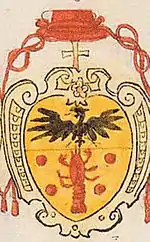Gianfrancesco Gambara
Gianfrancesco Gambara (1533–1587) was an Italian Roman Catholic cardinal and bishop.
.jpg.webp)

Biography
Gianfrancesco Gambara was born in Brescia on February 16, 1533, the son of Brunoro Gambara, count of Pralboino (a field marshal in the army of Charles V, Holy Roman Emperor) and Virginia Pallavicini, widow of Ranuccio Farnese.[1] He was the nephew of Cardinal Uberto Gambara.[1] After his father's death, his mother married a third time, to Gilberto Borromeo, making Charles Borromeo his stepbrother.[1]
He began his studies at the University of Padua, then continued at the University of Bologna.[1] He completed his studies at the University of Perugia, becoming a doctor of both laws.[1]
He then joined his uncle the cardinal at the court of Charles V.[1] He later traveled to Rome and joined the court of Pope Julius III, who made him a privy chamberlain.[1] During the pontificate of Pope Pius IV, he became a cleric of the Apostolic Camera, eventually becoming its president.[1]
Pope Pius IV made him a cardinal deacon in the consistory of February 26, 1561.[1] He received the red hat and the titular church of Santi Marcellino e Pietro al Laterano (declared a deaconry pro illa vice) on March 10, 1561.[1]
As cardinal, he participated in the Council of Trent 1562-63.[1] In 1564, he signed the acts of the Council of Trent in the name of Pope Pius IV.[1] From August 22, 1565 until January 20, 1566, he was papal legate in Camerino.[1] He opted for the titular church of Santa Pudenziana on November 17, 1565.[1] He participated in the papal conclave of 1565-66 that elected Pope Pius V.[1]
On October 7, 1566, he was elected Bishop of Viterbo.[1] He was consecrated as a bishop by Pope Pius V in the Sistine Chapel on October 13, 1566.[1] In 1566, in the wake of an epidemic, he was put in charge of sanitation for Rome.[1] On July 4, 1567, he was named inquisitor general.[1] He opted for the titular church of Santa Prisca on July 3, 1570.[1] He was a participant in the papal conclave of 1572 that elected Pope Gregory XIII.[1] On October 17, 1572, he opted for the titular church of Sant'Anastasia.[1] He resigned the government of his diocese sometime before March 28, 1576.[1] He opted for the titular church of San Clemente on July 9, 1578, and then for Santa Maria in Trastevere on August 17, 1579.[1]
On December 5, 1580, he opted for the order of cardinal bishops and received the suburbicarian see of Albano.[1] He opted for the suburbicarian see of Palestrina on March 4, 1583.[1] He was a participant in the papal conclave of 1585 that elected Pope Sixtus V.[1]
He died in Rome on May 5, 1587.[1] He was buried in the church of Santa Maria della Quercia in Viterbo.[1]
References
| Wikimedia Commons has media related to Gianfrancesco Gambara. |
